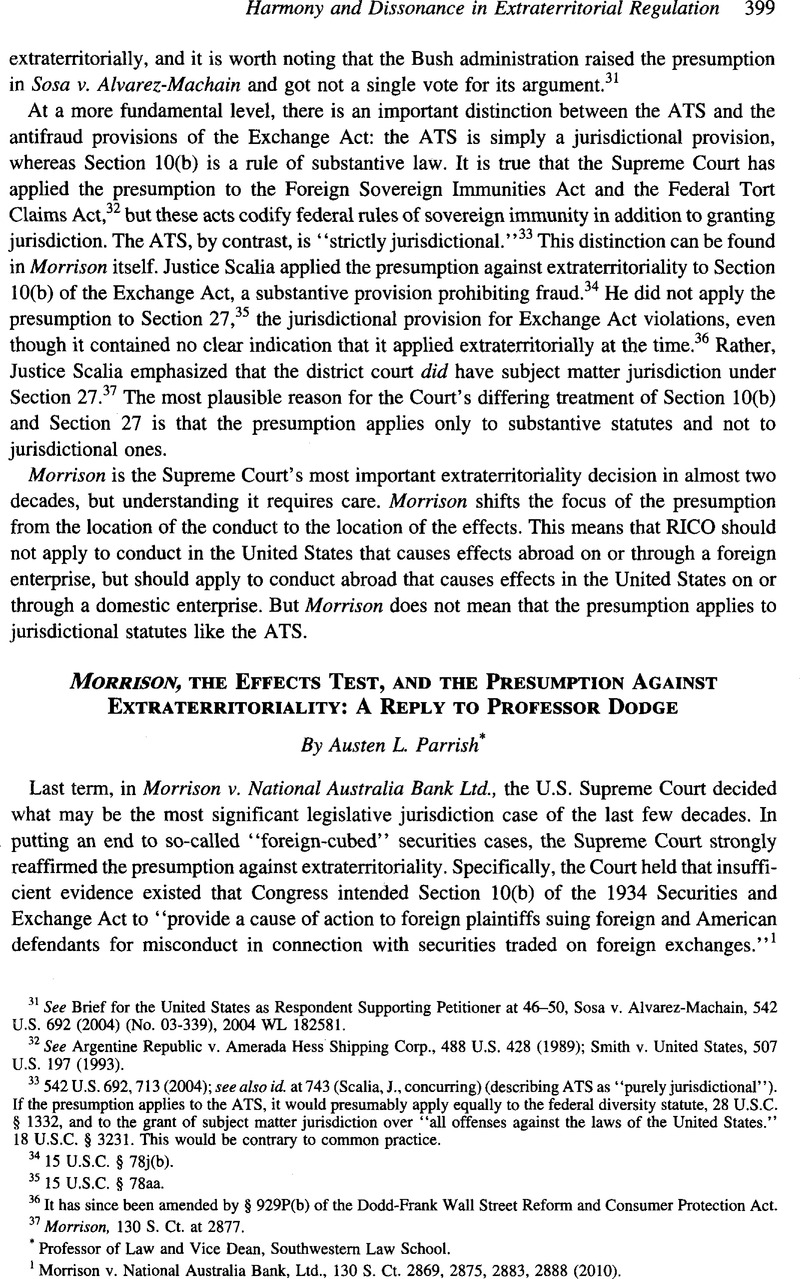Article contents
Morrison, the Effects Test, and the Presumption Against Extraterritoriality: A Reply to Professor Dodge
Published online by Cambridge University Press: 28 February 2017
Abstract

- Type
- Harmony and Dissonance in Extraterritorial Regulation
- Information
- Copyright
- Copyright © American Society of International Law 2011
References
1 Morrison v. National Australia Bank, Ltd., 130 S. Ct. 2869, 2875, 2883, 2888 (2010).
2 Id. at 2881.
3 For more on our competing perspectives, compare Dodge, William S., Understanding the Presumption Against Extraterritoriality, 16 Berkeley J. Int’l L. 85 (1998)Google Scholar, with Parrish, Austen L., The Effects Test: Extraterritoriality’s Fifth Business, 61 Vand. L. Rev. 1455 (2008)Google Scholar. For a general overview, see Meyer, Jeffrey A., Dual Illegality and Geoambiguous Law: A New Rule for Extraterritorial Application of U.S. Law, 95 Minn. L. Rev. 110, 114-18 (2010)Google Scholar (reviewing work of Professors Dodge and Parrish).
4 Morrison, 130 S. Ct. at 2877-81.
5 Id.
6 Id. at 2878-81, 2887.
7 Id. at 2881.
8 Id. at 2889-91.
9 See Parrish, supra note 3, at 1499 (describing how the effects test defines the outer limits of prescriptive power under international law); see also Brilmayer, Lea & Norchi, Charles, Federal Extraterritoriality and the Fifth Amendment Due Process, 105 Harv. L. Rev. 1217, 1223 (1992)CrossRefGoogle Scholar (describing constitutional limits on Congress’s power to enact extraterritorial legislation).
10 Jennings, R.Y., Extraterritorial Jurisdiction and the United States Antitrust Laws, 33 Brit. Y.B. Int’l L. 146, 160 (1957)Google Scholar (describing the effects test and explaining that “it would be absurd indeed if an almost unlimited extraterritorial jurisdiction could be ostensibly based upon a territorial principle of jurisdiction”); Born, Gary B. & Rutledge, Peter B., International Civil Litigation in United States Courts 573 (4th ed. 2007)Google Scholar (questioning whether the “effects doctrine” provides “almost limitless legislative jurisdiction”).
11 For a more extensive discussion, see Parrish, Austen L., Evading Legislative Jurisdiction, 87 Notre Dame L. Rev. (forthcoming 2012)Google Scholar; Parrish, Austen L., Reclaiming International Law from Extraterritoriality, 93 Minn. L. Rev. 815 (2009)Google Scholar.
12 Sandage, John B., Forum Non Conveniens and the Extraterritorial Application of United States Antitrust Law, 94 Yale L.J. 1693, 1698 (1985)CrossRefGoogle Scholar.
13 See Gibney, Mark P., The Extraterritorial Application of U.S. Law: The Perversion of Democratic Governance, the Reversal of Institutional Roles, and the Imperative of Establishing Normative Principles, 19 B.C. Int’l & Comp. L. Rev. 297, 312Google Scholar. For an argument that the right to democratic representation is itself an international norm, see Franck, Thomas M., The Emerging Right to Democratic Governance, 86 AM. J. Int’l L. 46 (1992)CrossRefGoogle Scholar.
14 See Developments in the Law: Extraterritoriality, 124 Harv. L. Rev. 1226, 1229-30 (2011)Google Scholar (describing “international law’s powerful norm against extraterritoriality,” but noting that “sometimes [the norm] yields to consensual political objectives”).
15 See generally Kal Raustiala, Does the Constitution Follow the Flag? the Evolution of Territorial-Ity in American Law (2009).
- 1
- Cited by


